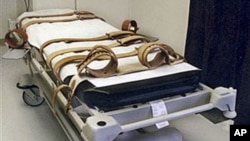Debate over capital punishment was re-ignited recently in Zimbabwe by two high-profile court cases.
The first - the High Court’s decision to sentence to death three policemen and a civilian, who murdered a security guard during a botched armed robbery four years ago, by the same court. The second - the Supreme Court’s quashing of a High Court death penalty sentence passed on a game ranger. The Supreme Court argued that the High Court had misled itself as it had ignored extenuating circumstances.
The decision by Zimbabwe’s courts, paradoxically, coincides with the African Union’s African Commission on Human and Peoples Rights' call, for the abolishment of the practice, at a conference held recently in Cotonou, Benin.
Human rights lawyer, Arnold Tsunga, an opposition Movement for Democratic Change legislator, who attended the meeting, supports the call.
The conference, organized by the Benin government, the AU’s Human Rights Commission, and death penalty opponents like Hands-off Cain and the non-violent radical party Transnational and Transparty, is among the growing voices against the practice.
Organizers hope to increase support among African countries ahead of a new resolution for a universal moratorium on executions at the next UN General Assembly, and the adoption of an additional African protocol for the abolition of the death penalty.
Tsunga said he is pleased that 19 out of 54 countries in Africa have defacto moratorium on the death penalty.
CONSTITUTION
Zimbabwe's constitution allows for the death penalty, but no one has been executed since 2004, in part because there was no hangman. Justice Minister Emmerson Mnangagwa, who was once sentenced to death by the rebel government of Ian Douglas Smith, has vowed not to sign any execution warrants.
Efforts by some prisoners to get off death row have failed. Shephard Mazango, who was sentenced to die by hanging in November 2009, for robbing and hacking a man to death, is one of them. On death penalty since 1999, Mazango, who was denied a presidential pardon, recently filed an emergency motion to have his sentence commuted to life in prison, arguing the long wait for his penalty has caused him mental anguish. Zimbabwean defence lawyers have argued that keeping convicted persons on death row, for years before execution, amounts to cruel and unusual punishment - which the constitution says is illegal. Amnesty international senior researcher Simeone Mawanza, said Zimbabwe must end capital punishment.
Human rights watch senior researcher, Dewa Mavhinga, concurs, adding the death penalty has no place in a democracy.
Harare lawyer, Jeremiah Bamu of the Zimbabwe Lawyers for Human Rights, cites religious scripture in his call to end executions.
UNFAIR TRIALS
Many opponents of capital punishment also argue that the practice can applied indiscriminately. Lawyer Arnold Tsunga argues some people end up on death row due to unfair trials or discrimination, against vulnerable groups or political opponents, as was the case during the fight for liberation for such leaders as Nelson Mandela and Robert Mugabe. Present day governments have been known to impose the death penalty on political opponents on charges of treason.
In 2013, Zimbabwe passed a new constitution to keep the death penalty, but only impose it on men aged between 21 and 70. Women are exempt. Mawanza argues the law, which also bans the use of death penalty as a mandatory punishment, is gender biased.
Architects of the new constitution - Douglas Mwonzora of the MDC-T and Zanu-PF’s Munyaradzi Paul Mangwana, say the law is not rigid on the death penalty.
Mwonzora admits to sharp differences over the issue, during the drafting process.
Zimbabwe’s prosecutor general Johannes Tomana, says his role is to execute the law. However, Tomana questions those who want to abolish the practice.
REFORMS
The debate over the death penalty has been complicated in recent years by such concerns as the fairness of the criminal justice system, the role of doctors in carrying out executions, and the possibility of reform and rehabilitation among death row inmates. Mavhinga said in light of these developments executing people are uncalled for.
Advocates for the abolishment of the death penalty in Africa have also been emboldened by developments in America where authorities in some states have botched executions. A death row inmate in Oklahoma, Clayton Lockett, 38, suffered a prolonged execution after the lethal injection he was given, failed to work. He eventually died of a heart attack.
In most American states, medical experts say the process of executing an inmate by lethal injection is inhuman as it involves the use of a three-drug combination. First, sodium thiopental, a sedative used as an anesthetic, renders the inmate unconscious. The second, pancuronium bromide, induces paralysis, and the third and final one, sodium chloride is injected to stop the heart from beating.
The lethal injection was developed in the 1970’s as an alternative to electrocution. In all but one of the 37 American states that currently have death penalty statutes, only Nebraska still uses the electric chair.
In total, 140-countries have abolished the death penalty for all crimes. Zimbabwe is one of the 36 African countries that still have a death sentence in their statue books. In 2013, at least 23 African states passed death sentences. At least five African countries carried out executions in 2013.








